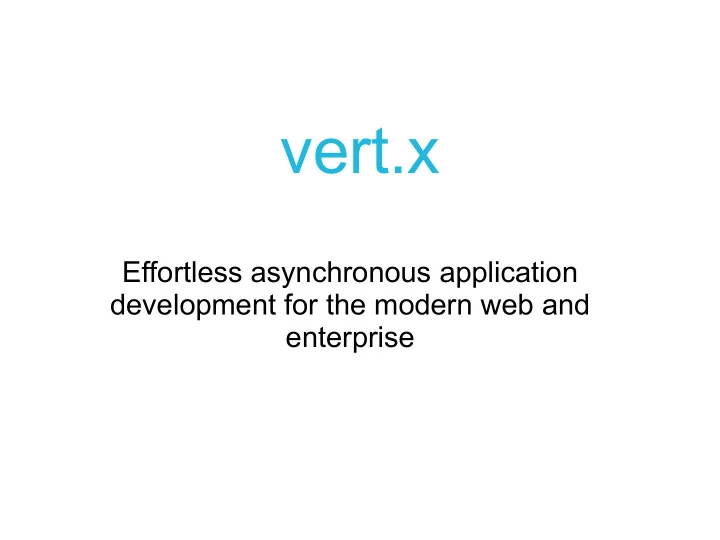

vert.x Effortless asynchronous application development for the modern web and enterprise
Stuart Williams 'Pid' Consulting Architect SpringSource Division of VMware* vert.x committer @pidster * Correct at time of writing
What is vert.x? Polyglot • Simple • Scalable • Asynchronous • Concurrent •
Polyglot Write application components in: JavaScript + CoffeeScript + AngularJS • Ruby • Python • Groovy • Java • Mix and match several programming languages in a single app.
Simple ...without being simplistic • Create real applications in just a few lines of code • No sprawling XML config •
Scalable Linear horizontal scale • Uses message passing • Automatic load-balancing • Efficiently utilise your server cores •
Asynchronous NIO • Handlers • EventBus • FileSystem • WebSockets • SockJS •
SockJS ● Handles the communication between the browser and the server. ● Provides a websocket-like API in client-side JS ● Works when websockets not available ● JSON-Polling, XHR-Polling/Streaming, etc ● Similar in some ways to socket.io ● More info at http://sockjs.org
Concurrency Model ● A verticle instance is single-threaded. ● Move away from 'Java-style' multi-threaded concurrency ● No more synchronized , volatile or locking ● Wave goodbye to many race conditions
Threading Model – Event Loops ● vert.x implements the Multi-Reactor Pattern ● An event loop is an OS thread ● Handles events for many handlers ● vert.x has multiple event loops – typically one per core. ● Don't block the event loop!
Event Loop != Silver Bullet ● Event loops not the best fit for all types of stuff ● Long running calculations (Fibonacci anyone?) ● Using blocking APIs – e.g. JDBC ● Most traditional Java libs have blocking APIs ● … how do we leverage them?
Hybrid Threading Model ● Don't force everything to run on an event loop ● Worker verticles can block ● Communicate with other verticles by message passing. ● Allows us to leverage the huge ecosystem of blocking Java libs
Real-time Web Applications ● Modern definition of real-time ● Event bus key technology for real-time web applications ● Focus on sending messages to server components or other browser nodes ● Mobile applications, online games ● Use vert.x with any JS toolkit.
Examples
JavaScript load('vertx.js’) vertx .createHttpServer().requestHandler( function (req) { var file = req.path === '/' ? 'index.html' : req.path; req.response.sendFile('webroot/' + file); }).listen(8080)
Ruby require "vertx" Vertx::HttpServer.new.request_handler do |req| file = req.uri == "/" ? "index.html" : req.uri req.response.send_file "webroot/#{file}" end.listen(8080)
Python import vertx server = vertx .create_http_server() @server.request_handler def request_handler(req): file = "index.html" if req.uri == "/" else req.uri req.response.send_file("webroot/%s"%file) server.listen(8080)
Groovy vertx .createHttpServer().requestHandler { req -> def file = req.uri == "/" ? "index.html" : req.uri req.response.sendFile "webroot/$file" }.listen(8080)
Java import org.vertx.java.core.Handler; import org.vertx.java.core.http.HttpServerRequest; import org.vertx.java.deploy.Verticle; public class Server extends Verticle { public void start() { vertx .createHttpServer().requestHandler(new Handler<HttpServerRequest>(){ public void handle(HttpServerRequest req) { String file = req.path.equals("/") ? "index.html" : req.path; req.response.sendFile("webroot/" + file); } }).listen(8080); } }
Architecture
Key Dependencies Java 7 • Netty • Hazelcast • Jackson • JRuby • Jython • Rhino •
Key API Methods vertx.createXXXServer vertx.createXXXClient vertx.fileSystem vertx.sharedData vertx.eventBus vertx.setPeriodic vertx.setTimer
Servers • NetServer • HttpServer – RouteMatcher – ServerWebSocket • SockJSServer
Clients • NetClient • HttpClient – WebSocket • SockJSSocket
EventBus eventBus.send(‘address’, message, replyHandler) eventBus.publish(‘address’, message) EventBus Bridge – send messages direct to JavaScript in • web browsers Messages are strongly typed in Java • JSON in JavaScript • Hash in Python, Ruby •
Cluster Hazelcast manages event bus address map and • cluster membership Explain cache, listeners • vert.x NetServer & NetClient used for comms • Fully configurable network ports • Use SSL for security •
vert.x Applications
Application Components Server Verticle Init Verticle EventBus Modules Worker Modules 8 20 Event Loop Worker Pool
Classloaders & Messages
launcher.js load('vertx.js') var config = { "address": "org.pidster.foobar.control", ”port": 8081 } vertx .deployModule('org.pidster.foobar-v1.0', config, 1, function(id) { // called when deployed }); function vertxStop() { // stop & clean up }
Modules Authentication Manager • Form Upload • JDBC Persistor • Mailer • Mongo Persistor • Session Manager • Web Server • Work Queue • AMQP •
mod-web-server load('vertx.js’) var config = { "web_root": <web_root>, "port", <port>, "ssl": <ssl>, "key_store_password": <key_store_password>, "key_store_path": <key_store_path>, } vertx .deployModule('vertx.web-server-v1.0', config, 1, function() { // deployed });
Module Simple structure • Optional lib dir • Lazy installation • Modules can include other modules • mod.json • { “main”:”org.pidster.jdbc.Main”, “worker”: “true”, “includes: “org.pidster-foobar-v1.0” }
Developing & Testing • Gradle or Maven (or Ant!) • Use a verticle script to launch tests • vertx-junit-annotations src/main/groovy src/test/groovy src/vertxInteg/groovy
Best Practice • Verticle script to manage lifecycle • Define configuration in JSON • Compose from modules • Never block the event loop!
What’s next?
Languages Languages as modules • Lazy installation • Scala • Clojure •
Scala • Basic implementation complete • TODO: examples and docs github.com/swilliams-vmw/vertx-lang-scala •
Scala Web Server vertx .createHttpServer .requestHandler({ req: HttpServerRequest => val file : String = if (req.path == “/”) “/index.html” else req.uri req.response.sendFile("webroot/" + file) }).listen(8080)
Management • JMX API • Publish metrics on EventBus in JSON • Configurable sample time & filters • GUI github.com/swilliams-vmw/mod-management •
Developers & API • IDE support Build config and plugins • Better, easier testing • More examples • Promises API? • Direct-style API using continuations? •
Project
Community • vert.x is Open Source • Active community • Contributions welcome • Module repository is growing • 8th most popular Java project on Github
Project http://vertx.io • @timfox – project lead • @pidster – project lurker • Uses Gradle for build • https://github.com/vert-x • Google Group: vertx •
Summary • Polyglot – use the languages you want • Simple concurrency – wave goodbye to most race conditions • Leverage existing Java library ecosystem • Powerful distributed event bus which spans client and server • Flexible module system
Questions?
Recommend
More recommend